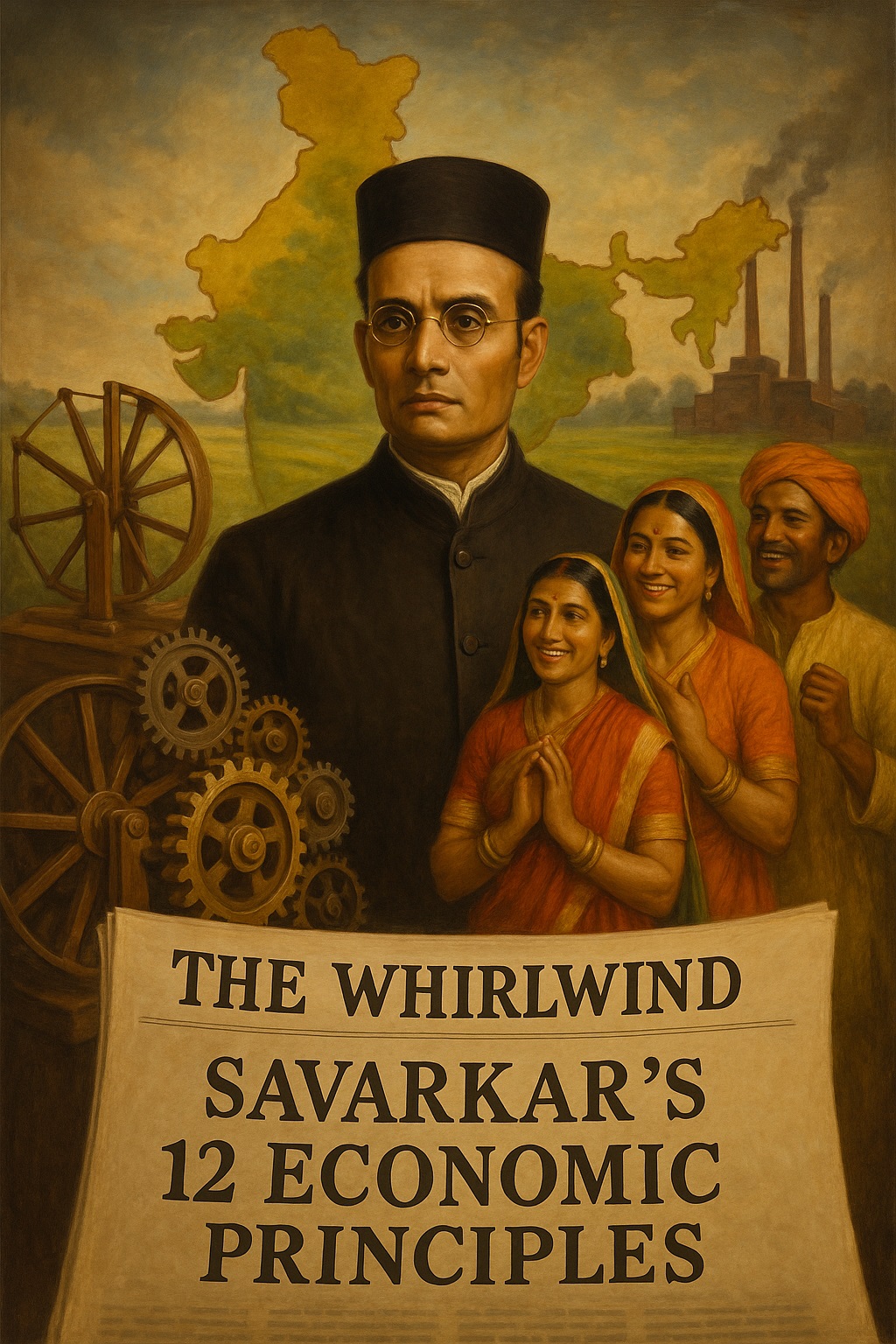Economic Dimension of Hindutva, Part 5; Savarkar’s Economic Principles (1/13)
The economic dimension of the Hindutva ideology is often overlooked in discussions dominated by its political and cultural aspects. However, the economic program articulated by Savarkar, particularly through his “12 Principles,” is crucial to understanding his vision for India’s future. These principles were presented during his presidential address at the 21st annual assembly of the Hindu Mahasabha (HMS) in Calcutta (now Kolkata) and are outlined in his work on the “benefit and role of machinery” in society.
Savarkar’s Vision for Economic Policy
Although Savarkar initially focused on social and political issues, he was acutely aware of the growing importance of economic policy by the late 1930s and early 1940s. The outbreak of World War II provided an opportunity for India to challenge British colonial rule, and Savarkar saw this as an ideal moment to formulate an economic policy. His vision was not just about political freedom but also about fostering an economy that could ensure self-sufficiency and prosperity for the Hindu community.
The Dual Objectives of the 12 Principles
Savarkar’s 12 Principles were designed to address two core objectives: economic growth and self-sufficiency. These principles, which can be seen as a blueprint for “national coordination of class interests,” were intended to guide India toward economic independence while protecting the economic interests of Hindus.
At the heart of these principles was a focus on creating an economy that would shield Hindus from what Savarkar perceived as the economic aggressions of non-Hindu communities in India. His economic vision sought to protect Hindu interests and to create a self-sustaining and independent nation-state, free from the dominance of colonial powers and other external influences.
The 12 Principles Explained
While the principles themselves cover a range of issues, the underlying theme is a commitment to self-reliance and national unity through economic empowerment. These guidelines can be interpreted as an effort to synchronize class interests for the greater good of the Hindu community, ensuring that no particular group dominates the economic landscape at the expense of others.
Savarkar’s principles were not just an abstract ideological framework; they were aimed at creating concrete changes in the economic structure of India. The primary goal was to ensure that the economic system was in tune with the values and needs of the Hindu community while advancing the overall development of the nation.
Final Thoughts
Savarkar’s 12 Principles represent a foundational aspect of his economic ideology, one that sought to integrate economic growth with national self-sufficiency. These principles reflect his deep concern for the economic future of the Hindu community, especially in the face of colonial exploitation and inter-community tensions. By envisioning a society where economic interests were coordinated for the benefit of the nation, Savarkar aimed to lay the groundwork for a future India that was not only politically free but economically self-sustaining and prosperous.
In the broader context of Hindutva, these principles provide insight into Savarkar’s desire to build an India that could stand on its own feet, free from external control or influence, and united in its economic and national pursuits.
After reading this, what is your understanding of the economic dimension of Hindutva? Share your insights in the comments below!
Sources:
DESHPANDE, Sudhakar. 1999. Savarkar. The Prophetic Voice. Dastane Ramchandra & Co.: Pune.
KRÜGER, Horst. 1985. Anfänge sozialistischen Denkens in Indien. Der Beginn der Rezeption sozialistischer Ideen vor 1914. Band II. Akademie-Verlag: Berlin.
PATWARDHAN, V. S. 1989. „Savarkar’s Economic Thinking“, in PHAKE, Sudhir/PURANDARE, B. M. and Bindumadhav JOSHI. (Eds.). 1989. Savarkar. Savarkar Darshan Pratishtnah (Trust): Bombai (Mumbai), 118-122.
PHADTARE, T. C. 1975. Social and Political Thought of Shri V.D. Savarkar. A Thesis submitted to the Marathwada University for the Degree of Doctor of Philosophy. Unpublished: Aurangabad.
ROTHERMUND, Dietmar. 1985. Indiens wirtschaftliche Entwicklung. Von der Kolonialherrschaft bis zur Gegenwart. Schöningh (UTB): Paderborn.
ROTHERMUND, Dietmar. 1983. The Indian Economy under British Rule and other Essays. Manohar: New Delhi.
SAVARKAR, Vinayak Damodar .2007. Hindu Rashtra Darshan. Bharat Bhushan. Abhishek Publications: New Delhi.
SAVARKAR, Vinayak Damodar. 1945. Hindu Rashtravad. Being an Exposition of the Ideology & Immediate Programme of Hindu Rashtra as outlined by Swatantrayaveer V.D. Savarkar. Rohtas Printing Press: Rohtak. (Collected & Edited by Satya Prakash).


Leave a Reply